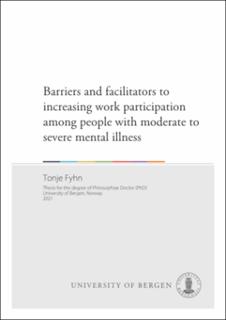| dc.contributor.author | Fyhn, Tonje | |
| dc.date.accessioned | 2021-04-16T07:53:26Z | |
| dc.date.available | 2021-04-16T07:53:26Z | |
| dc.date.issued | 2021-04-23 | |
| dc.date.submitted | 2021-04-14T11:20:44.245Z | |
| dc.identifier | container/56/1c/49/ed/561c49ed-5c6f-4b02-83d6-26021574ecc0 | |
| dc.identifier.isbn | 9788230867990 | |
| dc.identifier.isbn | 9788230842195 | |
| dc.identifier.uri | https://hdl.handle.net/11250/2738019 | |
| dc.description.abstract | This thesis seeks to identify facilitators and barriers to obtaining employment for people in treatment for moderate to severe mental illness. Many people with mental illness wish to pursue life goals such as ordinary employment, and several studies have demonstrated the positive association between employment and physical and mental health. Even so, obtaining ordinary employment can be a challenge, which is demonstrated by high unemployment rates among people with moderate to severe mental illness. The current thesis bases most of its work on an effect evaluation of the vocational rehabilitation program Individual Placement and Support (IPS). IPS provides long-term, individualized follow-up through an IPS specialist, with the goal of obtaining competitive employment.
Alhthough numerous international studies have proven IPS to be more effective than traditional forms of vocational rehabilitation, the trial described in this thesis was the first to investigate the effect of IPS in a Norwegian context. This context is characterized by a generous welfare system, which has many advantages, but may also create incentives to remain outside the workforce. It was therefore not given that IPS would be more effective than ordinary vocational services in this context. The effect evaluation did, however, prove it to be effective also in Norway. The work presented in the current thesis seeks to understand how the intervention works, and which factors influence employment for its target group.
Paper 1 investigates the IPS implementation through a process evaluation, utilizing data from IPS service providers, fidelity reports, and participants. The study uses mixed methods, with an emphasis on the quantitative material. Results from paper 1 show that IPS was implemented successfully across the six pilot centers, as demonstrated by satisfactory fidelity scores during the project period. Fidelity scores did indicate implementation challenges related to employment contact, providing community-based services, and integration with health services, which was further elaborated on in interviews with IPS specialists. Participants were overall very satisfied with the intervention, and emphasized the important role of the IPS specialist. Moreover, participants found freedom of disclosure to be important for participation. Less than half of the participants regarded their illness as a barrier to participation in the intervention.
Paper 2 investigates baseline-measured predictors for employment after 18 months, and whether group allocation (IPS vs TAU) moderates this effect. The study population consists of 327 participants from the IPS trial, and log binary regression analyses were conducted to investigate the research questions. Results indicate that while involuntary hospitalization is a strong negative predictor for employment at 18 months’ follow-up, directive emotional support and non-directive instrumental support positively predict employment. Self-reported measures of anxiety and depression, directive instrumental and non-directive emotional support, age, and education did not predict employment at 18 months in this study, supporting an inclusive approach to providing vocational rehabilitation to the target group.
Paper 3 investigates the perspective of Norwegian workplaces and their assessment of fictive job candidates who either had a mental illness, a physical disability, or a cultural minority background. Results show that supervisors and employees in Norwegian workplaces were generally reluctant towards vignette characters with a mental illness in terms of hireability. However, respondents who reported to have previous work experience with a colleague resembling the vignette character in question, generally assessed this character more positively than those who did not have this experience. Main concerns regarding the characters with a mental illness were social interaction and increased workload for colleagues. The paper concludes that job candidates with some kind of health issue are still likely to be underestimated in the labor market.
In conclusion, the findings of the PhD thesis highlight specific barriers and facilitators operating on different levels, to work participation for people with moderate to severe mental illness. It provides avenues for further research on these factors, and provides insights which may enhance vocational services for people in treatment for moderate to severe mental illness. Finally, findings on the workplace perspective should be addressed in the practical job development efforts conducted by IPS specialists, as well as in the governmental efforts to create a more inclusive work life. | en_US |
| dc.language.iso | eng | en_US |
| dc.publisher | The University of Bergen | en_US |
| dc.relation.haspart | Paper I: Fyhn, T., Ludvigsen, K., Reme, S.E. et al. A structured mixed method process evaluation of a randomized controlled trial of Individual Placement and Support (IPS). Implement Sci Commun 1, 95 (2020). The article is available in the thesis. The article is also available at: <a href=" https://doi.org/10.1186/s43058-020-00083-9" target="blank">https://doi.org/10.1186/s43058-020-00083-9</a> | en_US |
| dc.relation.haspart | Paper II: Fyhn, Øverland, & Reme. (2020). Predictors of employment in people with moderate to severe mental illness participating in a randomized controlled trial of Individual Placement and Support (IPS). International Journal of Social Psychiatry. The article is available at: <a href=" https://hdl.handle.net/11250/2738015" target="blank">https://hdl.handle.net/11250/2738015</a> | en_US |
| dc.relation.haspart | Paper III: Fyhn, T., Sveinsdottir, V., Reme, S. E., & Sandal, G.M. (2020). Employers’ and Employees’ Evaluations of Job Seekers with a Mental Illness, Disability, or of a Cultural Minority. The article is not available in BORA. | en_US |
| dc.rights | Attribution (CC BY). This item's rights statement or license does not apply to the included articles in the thesis. | |
| dc.rights.uri | https://creativecommons.org/licenses/by/4.0/ | |
| dc.title | Barriers and facilitators to increasing work participation among people with moderate to severe mental illness | en_US |
| dc.type | Doctoral thesis | en_US |
| dc.date.updated | 2021-04-14T11:20:44.245Z | |
| dc.rights.holder | Copyright the Author. | en_US |
| dc.contributor.orcid | 0000-0003-1768-5336 | |
| dc.description.degree | Doktorgradsavhandling | |
| fs.unitcode | 17-35-0 | |

